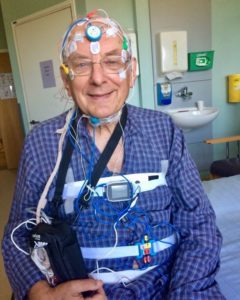
Researchers in the Oxford Parkinson’s Disease Centre have launched a new five-year study looking at the links between a condition known as Rapid Eye Movement Sleep Behaviour Disorder (RBD) and Parkinson’s.
Supported by the NIHR Oxford Biomedical Research Centre, the study seeks to improve the remote diagnosis and monitoring of sleep problems at home.
Sleep disorders can be an early indicator of problems with the nervous system.
The researchers, based in the University of Oxford’s Nuffield Department of Clinical Neurosciences and the Department of Physiology, Anatomy and Genetics, are particularly interested in the link between RBD and Parkinson’s because many people with Parkinson’s are thought to suffer from RBD as well.
Parkinson’s is a disorder of the nervous system causing tremor, stiffness and slowness of movement. RBD is a sleep problem where the switch that normally turns off movement during sleep is faulty, causing people to move or shout while asleep. A person who goes on to develop Parkinson’s may have RBD for many years before problems with their movement begin.
The team of researchers is led by Professor Michele Hu, a Consultant Neurologist at the John Radcliffe Hospital and University of Oxford who runs Europe’s largest research programme looking at RBD and Parkinson’s.
“My first aim is to identify the people with RBD who are at the highest risk of developing Parkinson’s before their symptoms appear,” Prof Hu said. “If we can do this, it may allow us to start them on treatment to slow down or even prevent the onset of Parkinson’s.
“My second aim is to understand the impact of Parkinson’s on sleep quality and whether people with Parkinson’s might benefit from treatment to help their sleep.”
Professor Hu is working with Professor Maarten De Vos in the Oxford Institute of Biomedical Engineering to develop computer algorithms that will provide instant diagnosis by processing the data collected from devices worn at home.
The first step is to invite people who need an NHS sleep study to wear the new equipment at the same time. Having both sets of data will help the team ‘train’ computer algorithms to correctly interpret the data that the wearable kit collects.
The team then hopes to recruit people from across the UK who have either RBD or PD, to wear the sleep monitoring device for a few nights every six months.
Email [email protected] for further information about the study.